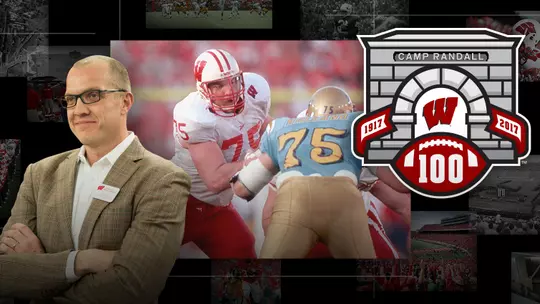
Camp Randall 100: Chris McIntosh
With help from ‘Jump Around,’ lineman helped Badgers realize Rose Bowl dreams
Mike Lucas
6/22/2017
The Camp Randall 100 is an exclusive list celebrating 100 people who have shaped Camp Randall Stadium's history across the realms of sports, music, culture and beyond. A new honoree will be revealed each day over the final 100 days leading up to kickoff of the Wisconsin football team's season opener with Utah State on Friday, Sept. 1. The Camp Randall 100 reveal is part of a year-long celebration of the history of the iconic stadium, which opened in 1917.
MADISON, Wis. — Chris McIntosh's first experience at Camp Randall Stadium didn't leave much of an impression on a 13-year-old kid from nearby Pewaukee. By the time he finished his All-America career with the Badgers, however, McIntosh had made countless memories.
So which moments stand out for the lineman who led the Badgers to back-to-back Rose Bowl wins?
Find out in his Camp Randall 100 profile below.
Camp Randall 100: Chris McIntosh
Although Chris McIntosh blew out his knee at the start of his senior year at Pewaukee High School, there was little indication of that injury when he reported to Wisconsin as a freshman. And from the onset, he was groomed to be a starter. Instead of going on the scout team, he was installed as the No. 2 left tackle behind Manny Castro. The Badgers had no intentions of playing him unless there was an emergency, but they were determined to accelerate his growth. Mission accomplished.
Once he got into the starting lineup, McIntosh was a dominating figure with his play and his personality as a bona fide team leader (two-time captain) and reliable fixture on an offensive line entrusted with opening holes for Ron Dayne. As a senior, he was a consensus first-team All-American. McIntosh, a first-round draft pick of the Seattle Seahawks, had his NFL career cut short by a neck injury.
But it was a temporary setback since he shifted his intense focus to the business world, where he founded and managed companies and climbed many more mountains, figuratively and literally (McIntosh has taken on Mount Rainier, Mount Orizaba and Mount McKinley). Today, he’s a member of Barry Alvarez’s senior staff as UW’s Associate Athletic Director for Business Development.
Chris McIntosh’s uncle took him to his first game at Camp Randall Stadium. McIntosh, then 13, doesn’t remember much from the experience other than they sat in the upper deck and the Badgers weren’t very good — they were 1-10 during Barry Alvarez’s first season in 1990.
“I grew up an hour down the road,” said McIntosh, who was raised in Pewaukee, “and a UW home game wasn’t an occasion that you’d put on the calendar and come over and see. At that point in time the Packers were the only football team that I paid attention to.”
During his recruitment in high school, though, Camp Randall was starting to feel like his home away from home. One experience stood out like no other.
“That was 1993 and that run,” he said of the Big Ten championship run and the trip to the Rose Bowl. “I remember coming down the tunnel to the field for pregame and standing there in the end zone watching the O-Line warming up.”
With great passion in his voice, 24 years later, McIntosh said, “I wanted to be one of those guys. (Mike) Verstegen. (Joe) Rudolph. (Cory) Raymer. (Steve) Stark. (Joe) Panos. I even had a poster of them on my wall in my bedroom when I was a kid.”
The following summer, July of 1994, McIntosh verbally committed to the Badgers.
McIntosh lived up to his promise as an All-American left tackle who started 50 games, the first UW player to ever do so. Today, at age 40, he’s still linked to these heartfelt words: “I didn’t come here to go to the Outback Bowl. I came here to win the Big Ten championship and play in the Rose Bowl.”
The time frame is important. While McIntosh was redshirting as a true freshman, the Badgers stumbled to a 4-5-2 record. As a redshirt freshman, they got to the Copper Bowl with a late-season surge. As a sophomore, they tailed off at the end and got blown out by Georgia in the Outback Bowl.
The final score was 33-6. And it wasn’t that close. That was the genesis for McIntosh’s comments.
I didn’t come here to go to the Outback Bowl. I came here to win the Big Ten championship and play in the Rose Bowl.Chris McIntosh
“It was during our first team meeting when we got back on campus after the Outback Bowl,” McIntosh recounted of the timeline. “Barry took care of some housekeeping — scheduling for winter conditioning — and then we got into the discussion of setting the tone for the offseason.”
Alvarez asked if any of the players had anything they would like to add.
The 6-foot-7, 310-pound McIntosh stood up and addressed his teammates.
“I don’t know if I’ve ever been more nervous,” he said, acknowledging that it was totally out of character. “But we had just come off a game where we had just been demolished, destroyed. And there was an opportunity — or a need — for some leadership on the team to emerge.
“There were some heads slowly nodding. And some discussion about it (what he had said). Really, the whole point about that particular talk was to emphasize what the people in the room were capable of accomplishing — we had all the tools that we needed to win the championship.”
And win they did. One shared and one outright Big Ten title. And back-to-back Rose Bowls.
In retrospect, McIntosh felt it was a matter of living up to the expectations of the 1993 team.
“It was matching or surpassing that (group),” he said. “That was the expectation. I had seen most of the moments from ’93 and I had this burning desire to experience it for myself as a player.”
Gallery: Camp Randall 100: Chris McIntosh
Here are three of McIntosh’s more memorable Camp Randall experiences:
BAND OF BROTHERS
“It was the very first game that I came here as a recruit my sophomore year (of high school). Rob Ianello was the recruiting coordinator. We were running a couple of minutes late and we were a little bit behind schedule to get down on the field for pregame and the band had already gathered in the tunnel.
“And they wouldn’t let us through. There was a trombone here and a tuba there. And they were all in our way. To put it mildly, it frustrated Ianello, who yelled at them, ‘You guys are used to the fans coming here to watch the band. Someday, they’ll come here to watch the players.’
“That was in ’92 before history was written. We eventually got on the field and it was cool. But essentially, we had to fight our way through the band to get down the ramp.”
FLINCHING CAN BE PAINFUL
“I will never forget during the break between the third and fourth quarter of the Penn State game (in 1998). We were probably on the 20 to 25 yard line coming out of the north end zone with the students to our back. Me and my fellow O-linemen were just kind of standing on the field.
“We’re facing south in front of the entire Penn State defense with LaVar Arrington and Courtney Brown when ‘Jump Around’ came on. It was the third rendition since it was played for the first time in the Purdue game, the longest game in the history of games.
“The Penn State players were looking into the student sections and they were stunned. If Barry was to describe it, he would have said, ‘They flinched.’ And you could see it. We’re heading into the fourth quarter — realizing if we win this game we’re going to the Rose Bowl — and they flinched.”
NO MAS, NO MAS
“The Ron Dayne game (in ’99) was especially memorable for me. That was the first game when a player from the opposing team asked me to stop (playing hard), to let up. I remember it was on a stretch play my way, I pulled and ended up on the safety and he asked me to let up and take it easy.
“I had some words for him. By that point in the game — and I don’t recall how many yards we had racked up rushing (60 carries for 420 yards) — but they wanted no more. That was like the ultimate compliment for an offensive lineman. It’s hard for me to imagine it getting better than that.”





















